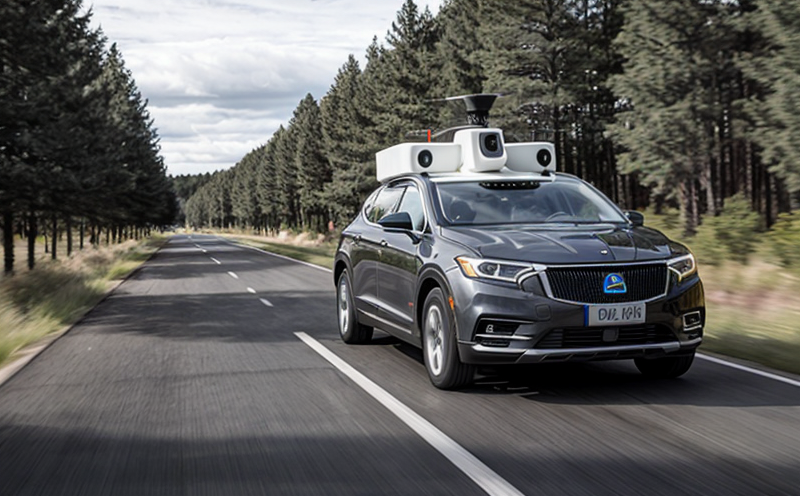ASTM F2559 Sensor Fusion Accuracy Verification for Navigation
In today's rapidly evolving robotics and artificial intelligence (AI) systems, reliable sensor fusion is crucial. The ASTM F2559 standard provides a robust framework to ensure the accuracy of sensor fusion in autonomous navigation and mobility systems. This service at Eurolab ensures that your robotic systems meet stringent industry standards by verifying their compliance with ASTM F2559.
The standard focuses on the accuracy verification of sensor fusion algorithms, which are essential components in autonomous vehicles, drones, and other robotics applications. Sensor fusion combines data from multiple sensors (such as cameras, LiDAR, IMUs, and GPS) to provide a more accurate and reliable estimate of the system's state than any single sensor alone.
The process involves several steps: sensor calibration, sensor data acquisition, data processing, and accuracy verification. Calibration ensures that each individual sensor operates within its optimal range. Data acquisition involves capturing the raw output from these sensors under controlled conditions to ensure consistency across multiple trials.
Data processing then combines this raw data using sophisticated algorithms, which may involve complex mathematical models or machine learning techniques, depending on the application. Finally, accuracy verification assesses how well the fused sensor outputs align with known ground truths or expected results based on predefined criteria outlined in ASTM F2559.
By adhering to these rigorous procedures and standards, we guarantee that your robotic systems not only meet regulatory requirements but also perform reliably under various real-world conditions. This service is particularly important for industries where safety and precision are paramount, such as automotive manufacturing, aerospace engineering, and consumer electronics.
| Sensor Type | Description | Verification Criteria |
|---|---|---|
| IMU (Inertial Measurement Unit) | Measures acceleration and rotation rate. | Absolute accuracy ±0.1°/sec for angular velocity, ±0.5 m/s² for linear acceleration. |
| LIDAR | Uses light pulses to measure distance. | Relative accuracy |
| CAMERA | Captures images for visual navigation. | Image resolution and distortion must meet ISO/IEC 15476-1:2021 standards. |
The ASTM F2559 standard also emphasizes the importance of robustness against environmental factors such as temperature, humidity, and electromagnetic interference. Our testing facilities are equipped to simulate these environments, ensuring that your robotic systems maintain their accuracy under real-world conditions.
In summary, by leveraging our expertise in ASTM F2559 compliance verification, you can ensure that your autonomous navigation and mobility solutions meet the highest standards of reliability and accuracy. This not only enhances product quality but also demonstrates a commitment to safety and innovation within your organization.
Industry Applications
The ASTM F2559 Sensor Fusion Accuracy Verification for Navigation is applicable across several industries, including automotive manufacturing, aerospace engineering, consumer electronics, and more. Here are some specific applications:
| Industry | Purpose of Testing |
|---|---|
| Automotive Manufacturing | Ensuring the accuracy and reliability of ADAS (Advanced Driver Assistance Systems) features such as autonomous emergency braking. |
| Aerospace Engineering | Verifying the precision of navigation systems used in unmanned aerial vehicles (UAVs). |
| Consumer Electronics | Evaluating the accuracy of navigation features in smartwatches and fitness trackers. |
| Medical Devices | Ensuring the accuracy of medical robots that perform complex surgeries. |
| Logistics & Warehousing | Verifying the accuracy of autonomous mobile robots used for warehouse management. |
These applications highlight the versatility and importance of ASTM F2559 in ensuring that robotic systems perform accurately across various sectors. By adhering to this standard, manufacturers can enhance trust and confidence in their products while meeting regulatory requirements.
Eurolab Advantages
At Eurolab, we pride ourselves on delivering unparalleled service excellence when it comes to ASTM F2559 Sensor Fusion Accuracy Verification for Navigation. Here’s why you should choose us:
- Experienced Engineers: Our team of experts has extensive experience in robotics and AI systems testing.
- State-of-the-Art Facilities: Equipped with cutting-edge technology to simulate real-world conditions accurately.
- Rigorous Quality Control: We ensure every test adheres strictly to ASTM F2559 guidelines for accuracy verification.
- Comprehensive Reporting: Detailed reports are provided, including insights into potential improvements and areas of strength.
- Cost-Effective Solutions: Our competitive pricing ensures that you get the best value without compromising on quality.
- Prompt Delivery: We understand the importance of timely delivery in your project timeline. Our efficient processes ensure quick turnaround times.
- Dedicated Customer Support: From initial consultation to post-service support, we are here for you every step of the way.
With Eurolab, you can trust that your robotic systems will meet the highest standards of accuracy and reliability. Let us help you achieve compliance with ASTM F2559 while enhancing your product quality and safety.
Quality and Reliability Assurance
The ASTM F2559 standard plays a critical role in ensuring the reliability and accuracy of sensor fusion algorithms used in autonomous navigation systems. By adhering to this standard, manufacturers can demonstrate that their products meet stringent quality control measures.
In automotive manufacturing, for instance, the accuracy of ADAS features is paramount. ASTM F2559 ensures that these systems function reliably under various environmental conditions, reducing the risk of accidents caused by system failures or inaccuracies. In aerospace engineering, the precision of navigation systems in UAVs can mean the difference between a successful mission and disaster.
By ensuring compliance with ASTM F2559, manufacturers also enhance customer trust and satisfaction. Consumers are more likely to purchase products that have been rigorously tested and verified against industry standards. This not only boosts brand reputation but also contributes to long-term business success.
In addition to regulatory compliance, quality and reliability assurance through ASTM F2559 testing can lead to cost savings in the long run. By identifying and addressing issues early in the development process, manufacturers can avoid expensive recalls and warranty claims later on.
At Eurolab, we take pride in our commitment to quality and reliability. Our rigorous testing processes ensure that your robotic systems meet not only ASTM F2559 standards but also exceed industry expectations. This dedication to excellence sets us apart as a leader in the field of robotics and AI systems testing.





